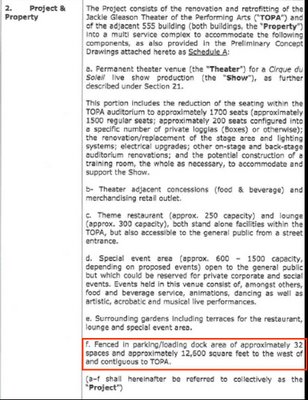Cirque exits stage; Live Nation takes it
BY DOUGLAS HANKS AND SUSAN ANASAGASTI
dhanks@MiamiHerald.com
Cirque du Soleil pulled out of a heated fight for Miami Beach's Jackie Gleason Theater, saying Wednesday it had no stomach for a political battle.
The surprise announcement came hours before a special City Commission meeting to consider three proposals for the 56-year-old theater.
With Cirque out, commissioners voted to negotiate an agreement with Live Nation, the country's largest concert promoter, to take over the 2,700-seat theater.
The Los Angeles-based company behind recent tours by Madonna and U2 would spend $3.5 million transforming the Gleason into a concert venue with a focus on rock and Latin pop.
The new theater would also get a new moniker: The Fillmore Miami Beach at the Incredible Jackie Gleason Theater, after a famous Live Nation auditorium in San Francisco.
But commissioners said they might still want to negotiate the name change.
Cirque's abrupt withdrawal ends nearly two years of talks between city officials and the entertainment giant. Cirque proposed a $100 million redo of the city-owned Gleason for its only permanent theater outside of Las Vegas and Orlando.
''Politics might be fun for some. It's not fun for us,'' Cirque CEO Daniel Lamarre said in a hastily called news conference at South Beach's National Hotel. ``Am I going to fight to sell this? I'm sorry. I just cannot.''
BOON FOR TOURISM
Hoteliers touted Cirque as a boon for a tourist destination lacking attractions beyond its beach and nightclubs. But residents questioned spending a requested $55 million of public money on renovating the Cirque theater and urged commissioners to keep the Gleason as a theater with a variety of acts.
Live Nation and its rival in the concert industry, AEG Live, both offered to renovate the money-losing Gleason and then rent it from the city.
Cirque was considered a narrow favorite in the three-way contest, but commissioners faced pressure from critics to delay Wednesday's scheduled vote on the matter.
Lamarre blamed the pullout on the anticipated postponement -- as well as an apparent softening of support for Cirque.
Citing next year's mayoral election -- which is expected to include at least three sitting commissioners -- Lamarre added: ``I guess people were jockeying for position.''
Cirque's exit followed a public hearing Monday at which residents applauded loudly at anti-Cirque comments.
Wednesday morning, City Manager Jorge Gonzalez, who led negotiations with Cirque for more than a year, issued a long-awaited recommendation to commissioners.
Gonzalez stopped short of endorsing Cirque over the other two candidates and suggested that commissioners might want to delay their vote by a week or two.
''What was happening in the last few days [was] totally contradictory to what we were told,'' Lamarre said. ``We have been told we were desired by the city.''
The Chamber of Commerce and residents criticized the city for wanting to vote on the proposals only five days after making them public.
Live Nation offered $1 million annual rent for 15 years, with modest annual increases.
AEG Live offered a base rent of $250,000, saying it needed to keep costs down in order to bring a broad range of acts to the Gleason, including televised awards shows and theatrical productions.
`A GREAT DAY'
Live Nation brought the Broadway series to the Gleason, moving it this year to Miami's new Carnival Center for the Performing Arts. The publicly traded company also owns West Palm Beach's Sound Advice Amphitheater.
''It's a great day for Live Nation,'' said Bruce Eskowitz, the company's president for global venues. ``I thought we had the best proposal all along.''
The rival concert promoters came late to the Gleason fight, scrambling a process that originally focused on Cirque. The famed human circus quietly began talking with Gonzalez's staff in late 2004, and later offered an ambitious remake of the Gleason into a lavish theater, surrounded by a restaurant, lounge and nightclub.
Early on, the Montreal-based company signaled it wanted no part of a political battle. Its negotiating team said a referendum on the project would be a deal-killer.
But in the spring, AEG Live began pressing Miami Beach to allow it to compete for the Gleason, too. In July, commissioners voted to let both AEG Live and its larger competitor, Live Nation, negotiate initial deals with Gonzalez.
This would have been Cirque's first government partnership; its five Vegas theaters are in casinos and a sixth is at Walt Disney World in Orlando.
Lamarre suggested he still will pursue a theater in South Florida with a private developer.
''I have to be very, very open with you. I love your city,'' Lamarre said. ``We've done a lot of analysis -- there are few cities in the world where we can do a permanent show.
``I know my phone is going to ring tomorrow.''
